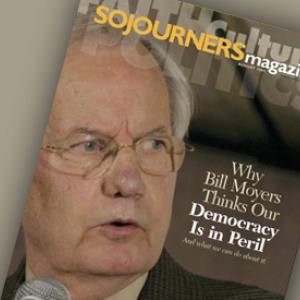
Danny Duncan Collum, author of the novel White Boy, teaches writing at Kentucky State University in Frankfort.
Posts By This Author
In Iraq, the Truth is Out There
Throughout the first year of the Iraq war, the Bush administration managed to keep a pretty tight lid on the war news that reached U.S. media consumers. Embedded reporters told the battlefront story from the viewpoint of U.S. troops.
Plagiarize This
Copyright laws choke the commingling streams of King Lear, Iggy Pop, and "Louie Louie."
"Plagiarism is basic to all culture." Pete Seeger claims that his father, a Harvard musicologist, told him that. To which I could only reply (plagiarizing Jerry Lee Lewis), "You're so right you don't know what you're saying."
Seeger was, of course, talking mostly about the folk cultural process by which the same stories and tunes get passed down and reinterpreted from generation to generation. Today that process continues in popular culture. If you don't believe me, read Dave Marsh's landmark work of cultural criticism, Louie Louie.
In his book, Marsh traces the strange career of that tune from its beginnings as a pseudo-calypso authored by an L.A. rhythm-and-blues singer named Richard Berry, who was inspired by a "cha-cha" he'd heard from a band of Filipino-Americans. Marsh follows the song through various cover versions by white Pacific Northwest garage bands. One of those bands, The Kingsmen, had half-learned the song off a jukebox. They twisted the beat into the now-famous "duh-duh-duh, duh-duh," and, since their singer didn't know all the lyrics, he mumbled through some lines. This led to the legendary "secret dirty lyrics," which led to a national scandal and even an FBI investigation, which declared The Kingsmen's recording unintelligible at any speed. But Marsh's story doesn't end there. He follows "Louie Louie" through an afterlife in which it became the template for countless garage-rock records (starting with that class-conscious classic "Hang On Sloopy"); the "secret lyrics" are finally recorded by Iggy Pop and The Stooges; "Louie Louie" becomes a marching band classic; and the song's signature riff is reincarnated (with more unintelligible lyrics) as Nirvana's "Smells Like Teen Spirit."
Indecent Exposure
Man of the Decade
If we get the heroes we deserve, then Pete Rose may just be the man for America today.
Keeping it Real
Sam Phillips spread the blues, broke racial barriers - and left a mixed legacy.
Carriers of the Torch
The beer-commercial sensibility of deliberate, cultivated empty-headedness is pervasive.
Rebellion as a Marketing Strategy
Today rock dozes comfortably in the belly of the beast.
Open Letter to Dennis Kucinich
It Came From Hollywood
There's been a resurgence of entertaining protest - or, at least, protesting entertainers.
Big Tobacco Masters Newspeak
Philip Morris is the public face of American tobacco.
Fighting a Cultural Battle
As this is written, rescue workers are still separating the bodies from the bamboo after the terrorist bombing of a nightclub in Bali.
Facing Up to Tragedy
Bruce Springsteen dives straight into the pain…and the ambiguity.
Life During Wartime, Again
I'm reluctant to mouth off about something like the 30th anniversary of the Watergate break-in and all that followed. It makes me feel old.
Don't Get Above Your Raisin'
In country music, the greatest sins are pretense and snobbery.
That sentence is the title of historian Bill Malone's new book about country music (the subtitle is Country Music and the Southern Working Class). Before that, in 1981, it was the title of a hit record by country music neo-traditionalist Ricky Skaggs. In 1951, it was recorded by Lester Flatt and Earl Scruggs. But long before any of this, it was (and still is) a common piece of folk wisdom among lower-class white people, especially in the South.
For many people of other regions or social classes, the saying may sound odd, counter-intuitive, and even un-American. In America, we're often told that "getting above your raisin'"—transcending the circumstances of birth—is the main point of existence. If Abe Lincoln had stayed in the log cabin, who would care? If Elvis had become a sincere but flat-broke folk singer, we wouldn't know his name. Americans don't buy stories about virtuous poor boys who stay poor, and we're offended at the suggestion that there might be something wrong with individual self-realization. The impulse to rise above our origins is buried deep in our national DNA. Immigrants have always come here to escape poverty and persecution and become rich and powerful. The right to perpetual self-invention might as well be enshrined in the Constitution.
The heretical wisdom embodied in "Don't get above your raisin'" suggests that roots, family, communal identity, and solidarity are all more important than individual striving or success. This is a way of thinking that most American intellectuals would associate with "traditional" or "pre-modern" cultures. But Malone, a professor emeritus in history from Tulane University, is also a good old boy from East Texas who knows that the preference for group loyalty and solidarity has lived on in modern America among rural people and blue-collar workers. In Don't Get Above Your Raisin', he argues persuasively that, in the last half of the 20th century, country music, which expressed the daily concerns of white Southern working people, broke out of the Southern region to become the cultural voice of America's white working class.
